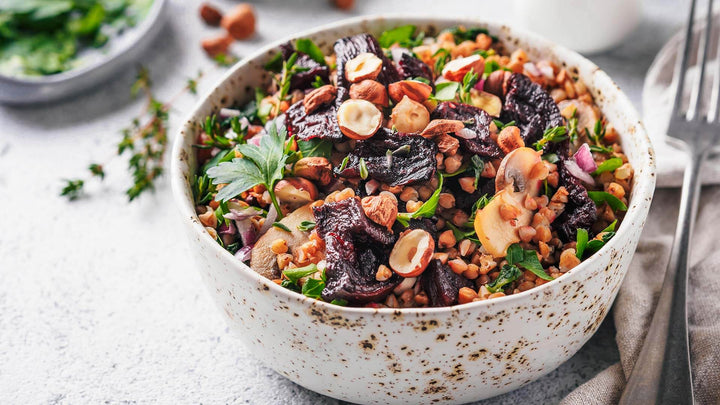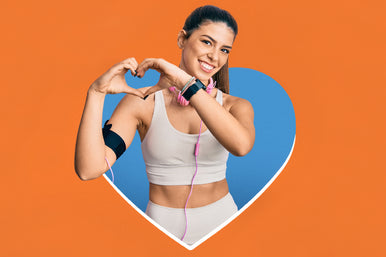

We are often told that consuming animal products is essential for us to be healthy and active. We may worry that as a vegan, our diet may hamper our physical performance.
But we do not need to abandon our plant-based diet to be at our best.
In fact, many elite athletes have turned to veganism as a way to enhance their health, strength and overall sporting success.
Of course, when we eliminate meat, dairy, and fish, we do need to take care to ensure we do not become depleted in key nutrients, but with a little planning, there is no reason we can’t meet our nutritional needs.
Here we discuss what you can do today to ensure you can perform well when plant based.
1. Make sure you meet your energy requirements
Of course, we don’t want to be putting on weight if it is not our goal, however when we are aiming for an active lifestyle, we do need to fuel ourselves well. Animal products tend to be higher in calories and nutrients, therefore it is important we reach our energy needs. We can do this by:
- Ensuring we get enough low GI complex carbs- think sweet potatoes, oats, buckwheat noodles etc. These will provide us with the glucose we need to perform, without adversely affecting our blood sugar levels
- Don’t be afraid of fat- it can help our blood sugar management to pair complex carbs with fat- this reduces the rate at which insulin is produced, and helps to keep us on the even keel we need to exercise well
- Remember to include protein throughout the day- it can be easy to overconsume carbs on a vegan diet, but we need a balance of macros to meet our energy needs.
2. Stock up on omega 3 fatty acids
Omega 3 falls into the category of essential fatty acids. This means the body cannot make its own and needs us to get enough through our diet. We need omega 3 for all manner of things, and evidence shows it can support both heart and brain health.
When it comes to exercise, it can help to dampen down the inflammatory response, improve tissue repair and support muscle growth- making it an essential part of our diet.
Whilst you can get omega 3 through plant-based foods such as walnuts and chia seeds, it is in the ALA form. Our bodies need to then convert this into DHA- which is not an efficient process, this means we can end up lacking in these essential fats.
An easy way around this is to introduce a supplement derived from marine algae- this is already in the potent DHA form and can support our bodies in multiple ways.
3. Mix and match your protein sources
As we discussed in ‘Protein Myths’, it is absolutely possible to get enough protein on a plant-based diet, as you can find good quality protein in a number of vegan friendly foods such as:
- Quinoa
- Tofu/ tempeh
- Beans/ pulses/ legumes
- Nuts + seeds
However, we want to make sure that we get all the essential amino acids the body needs for repair and growth processes, and in regard to training- to support muscle development and strength. Therefore, by alternating our protein sources, and by combining a protein with a grain- I.E beans and wholegrain bread, or rice and beans, we can ensure we are getting the full range of amino acids our bodies need.
4. Don’t become deficient in key nutrients
As well as meeting our energy needs via adequate macronutrient intake, we also want to ensure our micronutrient requirements are met too. We will struggle to train well if we lack minerals and vitamins which support our energy metabolism, our nervous system, and our immunity.
Here are the key nutrients to watch out for:
- Vitamin B12
- Vitamin D
- Calcium + Iron
You can prevent deficiency by including fortified foods and a comprehensive vegan friendly supplement into your lifestyle, as well as maximising a nutrient dense diet which includes a range of vitamins and minerals, each and every day.
5. Consider supplementary protein
As mentioned, it is possible to get a good protein intake via diet alone.
However, if you are regularly training for 1+ hour a day, doing lots of weight bearing or muscle heavy movement, and have specific goals around body mass/ muscle growth, you may want to consider including supplementary protein powders into your regime.
There are now some brilliant plant-based protein shakes on the market, derived from protein sources such as hemp, pea, and soy, and they can be a great post workout addition to replenish your stores and promote muscle growth/ recovery.
Just remember that if you are not working out a lot, then supplementary protein can contribute to weight gain due to its effect on insulin production, therefore do not go overboard on your rest days.
Key takeaways:
- Being vegan does not need to be a barrier to your exercise/ sporting goals, it just requires a little extra consideration
- Make sure you meet your energy goals by including adequate complex carbs, healthy proteins, and fats
- You will need to supplement via marine algae to get the essential fatty acids you need to reduce exercise induced inflammation/ injury
- Ensuring you mix and match vegan protein sources will give your body the range of amino acids it needs to function well
- Focus on a nutrient dense diet with added vegan friendly multivitamins to ensure you do not become depleted in key nutrients
The bibliography:
1 Tomova A, Bukovsky I, Rembert E, et al. The Effects of Vegetarian and Vegan Diets on Gut Microbiota. Front Nutr. 2019;6:47. doi:10.3389/fnut.2019.00047
2 Kuchakulla M, Nackeeran S, Blachman-Braun R, Ramasamy R. The association between plant-based content in diet and testosterone levels in US adults. World J Urol. 2020. doi:10.1007/s00345-020-03276-y
3 Obeid R, Heil SG, Verhoeven MMA, van den Heuvel EGHM, de Groot LCPGM, Eussen SJPM. Vitamin B12 intake from animal foods, biomarkers, and health aspects. Front Nutr. 2019. doi:10.3389/fnut.2019.00093
4 Tipton KD. Nutritional Support for Exercise-Induced Injuries. Sport Med. 2015. doi:10.1007/s40279-015-0398-4


